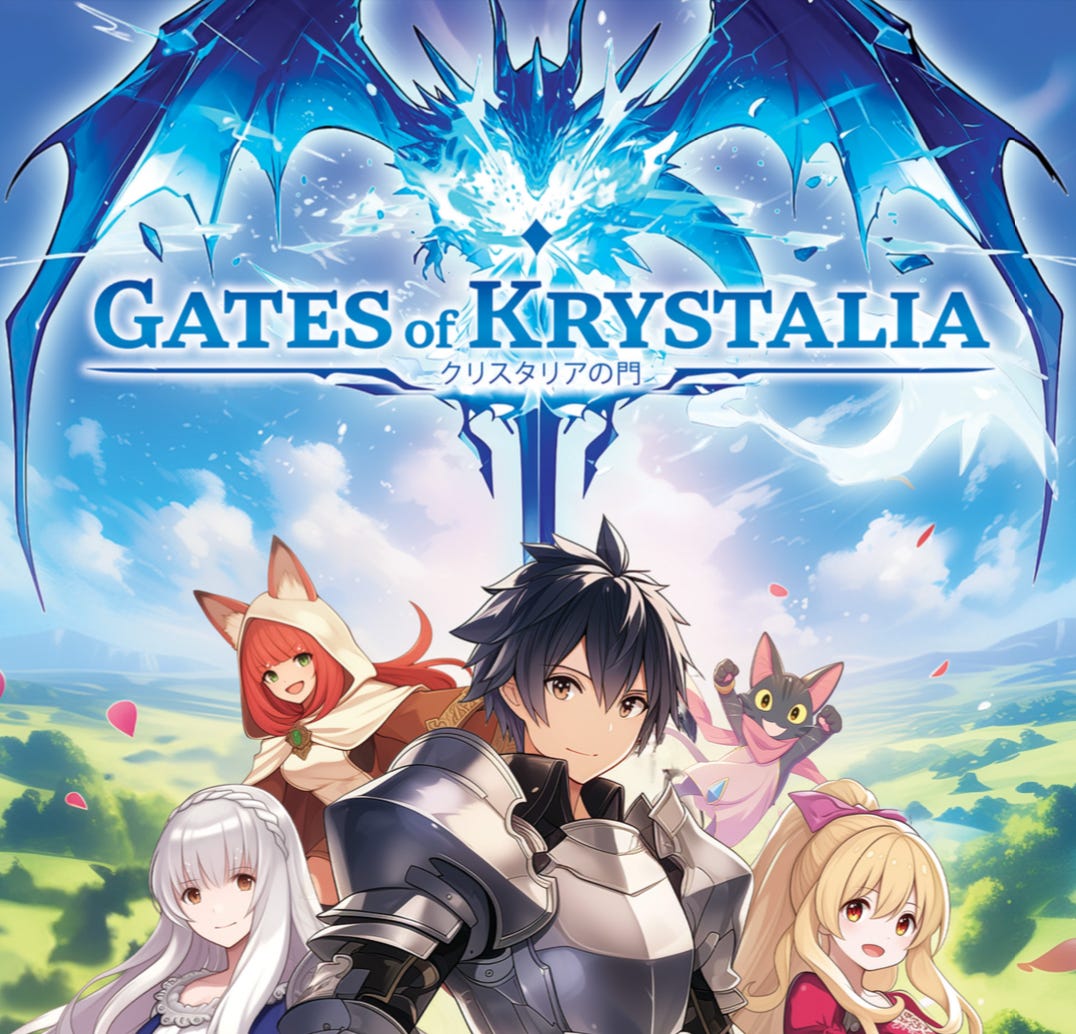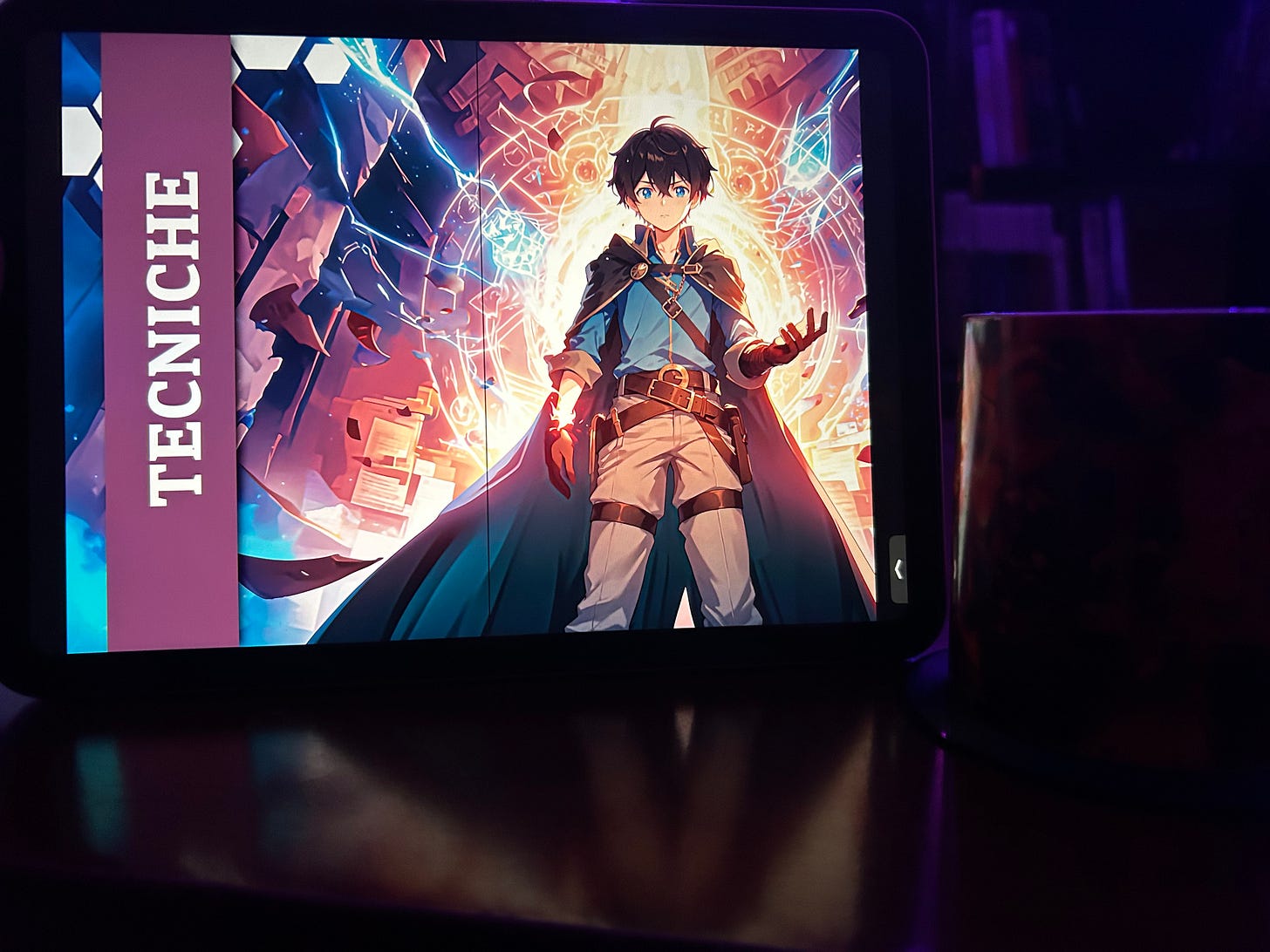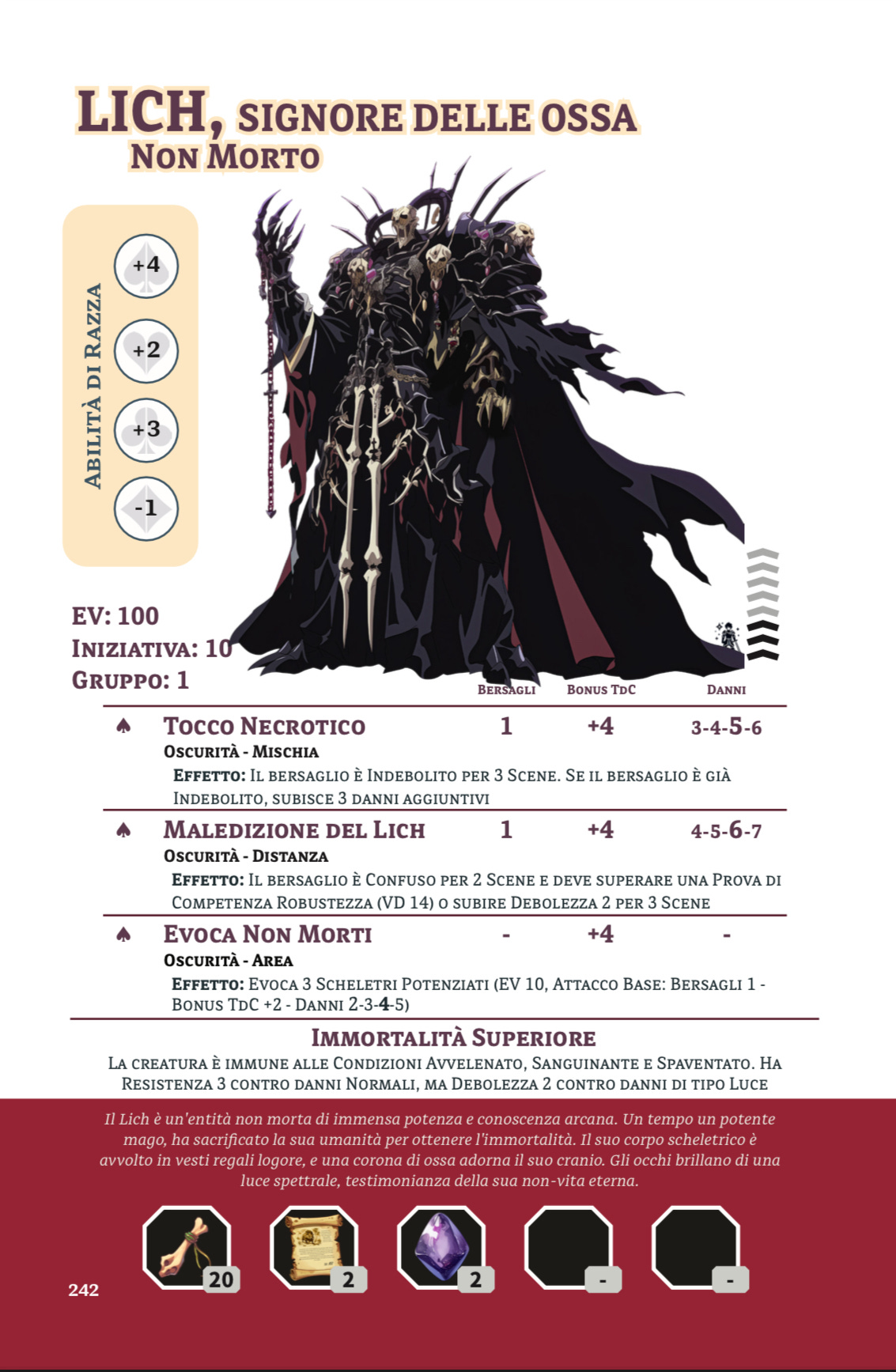I personally don’t pledge much, because I’ve no extra money and I’m plenty of games I want to play. Sometimes, though, a few concepts scratch my itch and start rumbling in my head, especially those with JRPG styled narrative attached.
And so, long story short, I got into Krystalia, an Isekai world of wonders heavily leaning towards the crystal era of final fantasy, some Sword Art: Online sensibilities and a knack for grabbing your attention and finger towards the back this project button.
I pressed play and…
What is GoK?
Gates of Krystalia is an inspired sandbox mmoJrpg which serves as both the narrative and mechanical foundation of this colourful tabletop rpg. Your alter ego is a Hero, but you’ve been summoned into the game (you decide how much depth you want to give to the real world aspect) and start delving into its magic and sometimes terrifying world through a clever introduction, leading to a very fast, but still incredibly deep Hero Creation.
The game uses standard decks of 52 playing cards and that’s a unique match: I HATE standard cards in roleplaying games, but GoK is one of those projects where they make actual sense, we’ll see why. Mechanics-wise, you draw a card, use its number as the baseline for your check and get to add a few modifiers in order to beat a target number. If you draw figures you gain special effects in combat.
Most rules in the first section cover combat itself, since you are in a mmorpg and it is assumed that you’ll excpore dangerous places, but you don’t need loads of narrative guidance since checks are straightforward and the Deux (the GM) is essentially free to build more or less complex scenarios, involving interaction, investigation and the exploration of dungeons, which are lovely connected to the lore as living places spontaneusly forming as natural energy surges. I won’t spoil much about the lore. Overall, it’s a huge sandbox you can fill at taste.
The Book
GoK is introduced in a well organised book with mostly AI generated art (which are going to receive proper treatment in the upcoming weeks) but I have to say it’s a lovely piece of love. The layout is inspiring and colourful, content is sorted in green (basic rules) and red-ish (advanced rules), quickly pointing you at the stuff you want to learn first (such the majority of the rules) and the things you might introduce later (such as kingdom management or romances).
As I’ve read both the QuickStart rules in ENG and the early access ITA book, I’ve to say the book is well written, with some minor typos here and there and a few inconsistencies they are working on as more feedback arrives to the ears of the kind authors (they allow you to fill a form with extensive notes and lots of space to write your impressions and advice).
The book as a massive starting section including Hero Creation, all the Rules, Combat Tecnhniques, Races and Classes and Gear (gently introducing how non-money resources are used in the game, which is a lovely JRPG addition to recreate the sense of gathering and reward as you discover new places).
The central section of the book focuses on Techniques and Combat: it’s well organised and contains all you need to grasp the game mechanics in minutes. Easy read, with useful examples.
We then get to know more about Krystalia, a world saved from disaster but at a high cost, with hidden cults, shining crystals, weird dungeons forming, tainted places and legendary elemental crystals you can find to enhance your gear. The book does a great job in merging the story-telling side to the mechanical aspects, to the point you understand the overall design without much effort and in a single read.
The final and interesting part of the book is about Monsters: each monster as a one page illustration plus the useful stats. Monster mechanics are simplified and they are presented in tiers, matching the Hero tiers the game uses to easily define 4 different ranks, from Heroic to Legendary.
The book ends with a well made Glossary.
Note that throughout the chapter headers, you’ll find QR Codes to access the related content (such as sheets, additional content they’ll release and the original soundtrack!).
Your Deck is your Life
Your Life energy is 52. Yes, the deck is the tool you use to make checks and your life points, essentially. Cards you expend become fatigue and are placed facedown in an appropriate area. If you run out of cards, you run out of steam and you can even die if not properly treated. This makes healing a fun element, since you’ll both recover useful cards and actually feel like you are recovering, as your deck regains some volume.
Seeds
Every stat is connected to one of the four Seeds as most techniques are. You’ll get to choose blessed seeds, allowing you to double your value on related checks. This is a smart way to customise your character concept (below), as you’ll place emphasis on those skills you’ll feel are more relevant (a charming leader might choose to bless hearts so they will get a chance to be more impactful in Charisma related tasks).
Hero Creation
Your Hero is essentially a combination of a Race (10 to pick from), a Class (10 to pick from) and a bunch of Combat Techniques (loads to pick from, but very manageable in terms of text and crunch).
This will give you a net total of 6-7 Techniques making your combat style unique. It’s fun to see how many of these Techniques are actually roleplaying enablers, with some buffing available for yourself and your party members, whole regular attacks are inspired yet undefined events you can definitely customise to make every combat shine!
Your race and class will grant you innate perks you will use in and outside combat: some of these will grant you flat benefits. I.e., Humans have the chance to gain an extra point to start with, while Elves have a connection with Natural Magic. On the class side, Assassins get both the chance to manipulate the deck to be deadlier, while getting an interesting +2 bonus on sneaking actions. This shows how a character can creatively use their techniques as out-of-combat narrations as well, providing flavourful avatars.
You have to make a few choice and one of them is particularly interesting: your destiny basically dictates your drive. You might want to go back home as soon as possible and find a way out of the mmorpg… Or you might develop some sort of attachment to your in game role.
This is more than interesting if you look at the middle of the book, where you can find a plethora of meaningful background activities (from fishing to alchemy) where you can know new NPCs/allies, forge your kingdom and spend some relaxing and quality time with your mates. Your motives might change or even drive those scenes, which are useful to recover as well.
In the end, your character will be a fully fledged JRPG Hero, with an interesting background and some inputs to make your cinematic-action packed adventures look and feel immersive.
A word on who you “are”, Psychology and Corruption
As above you can decide you come from a cyberpunk world pretty much like ours, or from a dystopian society where you are only allowed to freely interact with others in virtual reality (pretty much my own setting for games like GoK xD).
The designers introduced an interesting element, which is your character’s Psychology: essentially working like a sanity rating, you’ll get traumatised by stuff you do in the game (such as killing an innocent person) and raise the ladder: you’ll start losing confidence and you’ll progressively be less and less efficient, until you’ll end up not being able to interact with the game world anymore. You can recover from this state by spending time with allies in familiar places, but the interesting part is that this is a very good world building element.
The Deux might want to portray a much darker version of the world and use Hero psychology as a weapon, possibly (I’m just adding content righ now xD) generating dark dungeons as more Heroes go insane!
The other side of the coin is Corruption which is even more frightening: it’s your character slowly suffering its effects, which can even grant boosts to your actions, until you are devoured by it. The fun part is that, unlike your sanity, Corruption is set at a particular level, and keep raising from there even if you manage to gain control over it for a while. Removing Corruption feels like an interesting quest enabler and along with character’s Psychology, add an important layer to the simulation.
Dynamic Combat
I won’t get into the rules that much, but you must know something: combat in GoK is playful and clever. You get to draw 5 cards and, on your turn, you’ll be able to perform both a skill check and to use a Combat Technique; the defender/s will do the same and that’s where the most brilliant killer app of the combat system kicks in! The action is simultaneous: you, as the attacker, might make a wrong choice or an unfortunate draw and suffer the consequence of the defender technique, as they’ll play one as well to counter your action!
This is truly dynamic and it’s fun, because combat will inevitably tear your deck out: you must be act cleverly and strategically think with your team members, or you’ll face a steady defeat.
As you draw and play cards, you’ll be able to forge unique combat moments, since you might even choose to throw a low card, suffer some consequences and then be ready to react with a powerful, defensive related Technique!
If you add all the elemental forces, the blessed seeds and the variable choices coming from your teammates, you’ll easily grasp how fun and dynamic this process might be!
It might definitely get a bit bogged down as the number of Techniques increase and I’m sure players will slowly find easy fixes for this, but I honestly think that with some games things will go pretty smoothly (especially because combat is not meant to last for aeons). You’ll be able to face or even avoid combat if needed, focusing more on exploration and clever problem solving, especially in troublesome times, when you have a low card count in your deck!
Please note that the complete freedom granted to both the Deux and the players and the open ended feel of Krystalia (with its “save the world, but beware the evil”) will definitely grant varied gaming sessions.
Activities
You have loads of things to do in GoK. In between (or even during) adventures, you can introduce the Kingdome management with a variety of structures added to it, like a fishing zone, a relax area, alchemical lab, the forge, a magic academy and more! All this places require resources and your Kingdom inhabitants must be fed and entertained, or they’ll basically cause havoc. Forget your Kingdom and it will crumble to dust!
This is considered an advanced rule options, but I consider it a lovely addition to any game: you can treat it more lightly if you want it to sit on the back, or you can just use the (well written) guidelines to make it really matter!
Please note that such activities have a double jeopardy: they both serve as resource generators (you’ll need resources to buy and build stuff, from weapons to money exchanges) and resting methods (since you won’t get to rest while dealing into dungeons or exploring the world).
Not counting, as I wrote above, the plethora of roleplaying opportunities to know new people, gain more quests, unlock secret info and deepen the relationships with other team members. Again, you have even a funny romance mechanic with a related harem, where you can be a well loved shenanigan or a hated person because you care too much about someone and end up neglecting someone else!
Wrapping up and general notes
The game is great and greatly presented. It needs some polishing, but they are working on it and I’m sure they’ll deliver an awesome product (late October/early November for the final PDF, late November for the physical product).
The late pledge is open and you can grab the PDF (screen friendly) for a honest price; with a few bucks you can access the boxed set including the physical book and a deck of cards.
Stretch goals have been unlocked and some of them include the funding of a future campaign for additional products (all the digital related stuff is in the works).
Gates of Krystalia is a brave attempt to provide an isekai/jrpg styled game with a very strong point: it’s far above well known project of its kind, since it’s simpler, very different (which is key for me, since I’m definitely back to my vanilla gamer state (all d20, genesys or a bunch of d6s - which means OVA RPG if we talk about J - , the rest is optional) and catchy.
The fact it uses cards is what actually makes it appealing: it’s not another dicey game sitting along with the ones I use (genesys, d&d related and a few other systems), but a feels like a unique gaming experience. It has great content for a fast-paced, Final Fantasy / Sword Art simulator and optional bits to make it a more deep and narrative focused mmorpg styled game.
With the basic options you can get started pretty fast, start delving into the world, exploring your inner motivation, fight monsters, gather resources, sell them, buy a house, create new gear and delve in to the intricacies of dungeons and underground mysteries, where places and beings nobody should dare to name hide…
Then, you can slowly unlock options as you go or just keep the game as simple as you like, spending time chatting with your team mates and companions, ready to find your way out of this clolourful nightmare or, who knows, or play an important role in a world that slowly starts feeling like home.
TSM








Come sempre sei il mio demone tentatore...
Tutte le volte che spieghi qualcosa lo fai sembrare super accattivante, cosa che poi risulta vera, non mi sono mai pentito di seguire i tuoi consigli.
Non sono fan del genere anche se ho adorato e visto più volte nel tempo SoW. Grazie del tempo che ci dedichi. Ci penserò su
Very nice! Are you currently playing? I'd like to play.